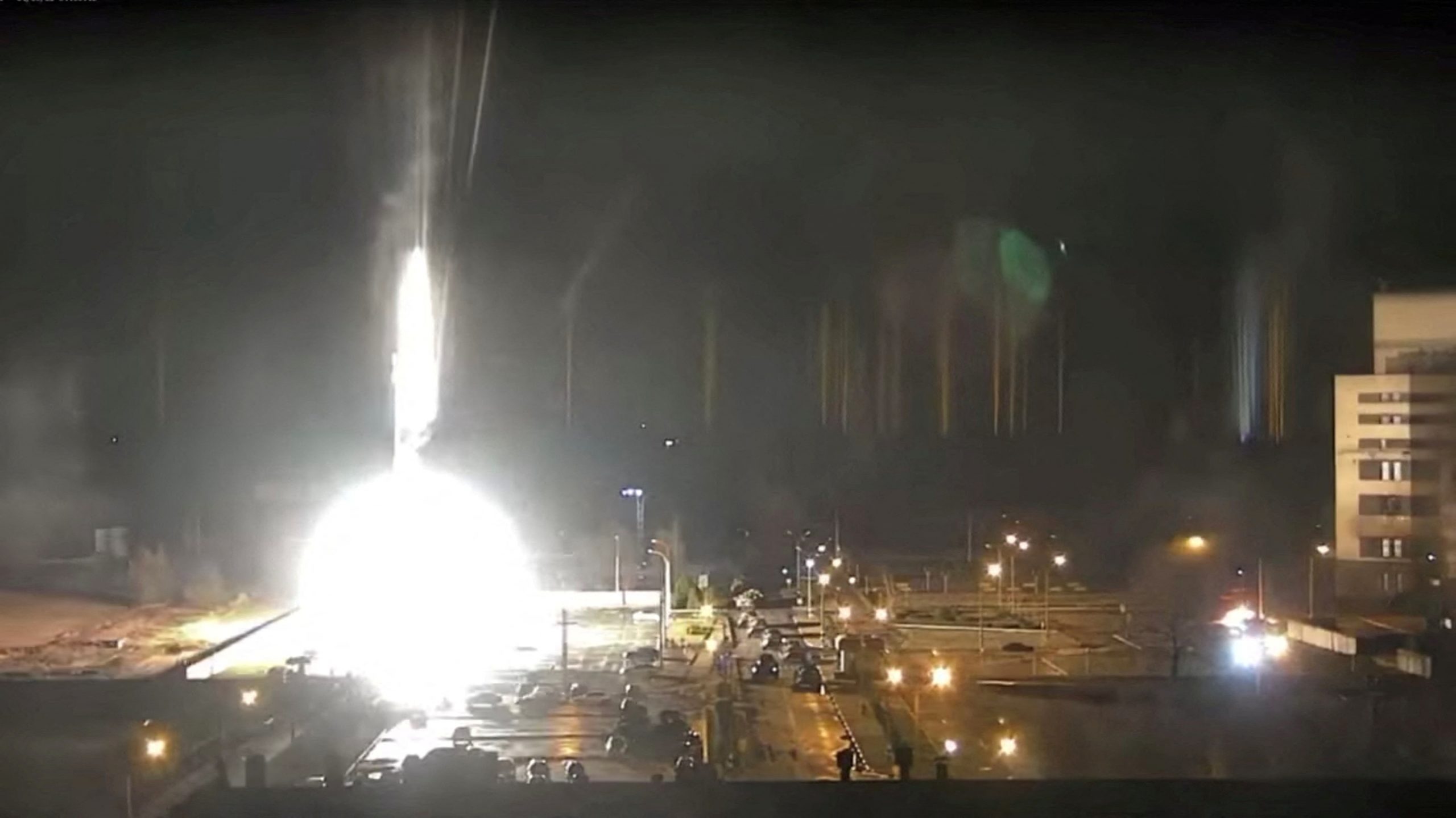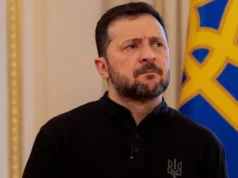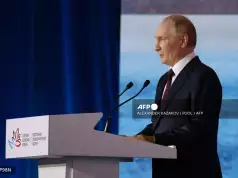Russian troops have seized Europe’s largest nuclear power plant in Ukraine after a firefight that set part of the complex ablaze with President Volodymyr Zelensky accused Putin of resorting to ‘nuclear terror’ and risking a catastrophe ‘six times worse than Chernobyl’ that would affect the whole continent.

Russian troops attacked the Zaporizhzhia plant in the early hours of Friday, with CCTV capturing a fierce gun battle between Putin’s men and Ukrainian defenders that sparked a fire in a six-story training building just outside the main complex. Moscow’s men then stopped firefighters from getting to the building for several hours as fighting raged.
Eventually, emergency crews were allowed to go in and douse the flames before Russian troops moved in an occupied the site, which provides a fifth of Ukraine’s electricity. The UN’s nuclear monitoring agency said that, fortunately, none of the site’s six reactors had been directly damaged and radiation levels remained normal.
However, news that Russian soldiers had put the plant at risk by opening fire close by and shelling it sparked dire warnings and international condemnation – with the head of the International Nuclear Energy Agency saying he was ‘deeply concerned. Prime Minister Boris Johnson, who spoke with Zelensky after the plant was attacked, called the attack ‘reckless’ and said Putin is now ‘threatening the security of the whole of Europe’.
Ukraine is home to three other active nuclear power plants, one of which is located 70 miles from the city of Mykolaiv which Russian forces have begun attacking after seizing nearby Kherson. The other two active sites are located in the west and are not currently under threat, though that situation could change as the Russian attack branches out. Ukraine also has five sites which are out of action, but could still pose a risk if hit by shells.
Russia’s war against Ukraine is now entering its ninth day and shows no sign of stopping any time soon after talks between the two sides yesterday broke up without agreement, before Vladimir Putin went on TV to declare that he would keep battling for ‘total victory’ whilst spouting propaganda that Russia’s forces are not deliberately targeting civilians and that the ‘special operation’ is proceeding on time with all of its major objectives completed to schedule.
Fighting is expected to ramp up around the cities of Mykolaiv and Odessa, in Ukraine’s south, in the coming days – with a mass amphibious assault on Odessa feared after dozens of Russian landing ships were pictured massing near Crimea.
The port city of Kherson fell to Russian soldiers yesterday with the city of Mariupol, on the other side of the Crimean peninsula, now under heavy bombardment as Moscow’s men try to bomb it into submission – with the aim being to cut off Ukrainian access to the Black Sea and deny the government access to lucrative trading routes.
Fighting is also continuing across the north and east, with Ukrainian special forces ambushing and destroying Russian tanks and armoured vehicles at Hostomel – to the west of the city – and Brovary – to the east – late yesterday and this morning. Ukraine also claimed its jets have targeted part of a 40-mile convoy currently stalled outside the city, amid fears it would encircle the capital and bombard it.
Meanwhile Chernihiv, to the north east of Kyiv, and Kharkiv, in Ukraine’s east, were braced for more heavy shelling today after days of increasingly indiscriminate attacks including with banned cluster munitions have left dozens of civilians dead.
President Putin is also stepping up actions on the home front, intended to head off internal dissent about the war as combat proves fiercer and harder than his generals anticipated, and western sanctions destroy large chunks of the economy.
Russia’s rubber-stamp parliament on Friday approved new laws that would see anyone spreading ‘fake news’ about the invasion jailed for up to 15 years. Putin had previously threatened and shut down radio and TV stations referring to the ‘war’ or ‘invasion’ of Ukraine – which Moscow prefers to call a ‘special military operation’.
Moscow also admitted to limiting news from outside sources getting into the country, with the BBC, Radio Free Europe/Radio Liberty, independent Russian site Meduza and Germany’s Deutsche Welle all restricted, while access to Facebook has been blocked.
Putin has also gone after peaceful protesters, with thousands arrested while marching in rallies around the country asking for the conflict to end.
President Zelensky accused Russia on Friday of unleashing ‘nuclear terror’ after his forces attacked the plant, claiming the Russian leader wanted to repeat the Chernobyl disaster – considered the worst nuclear disaster in history.
‘You know the word Chernobyl,’ he said in a video posted on Friday morning, calling on Russia to stop its attack on a nuclear power plant 350 miles south of Kyiv.
‘No country other than Russia has ever fired on nuclear power units.
‘This is the first time in our history. In the history of mankind.
‘The terrorist state now resorted to nuclear terror,’ he said in the video message.
Zelensky said: ‘Europe needs to wake up. The biggest nuclear power plant in Europe is on fire right now.
‘Russian tanks are shooting at the nuclear blocks. These are tanks equipped with thermal imagers, so they know what they are aiming at.’
Meanwhile, Moscow’s isolation deepened on Friday, with Airbnb becoming the latest company to pull out of the country – following Ikea, BP, Shell, HSBC, Apple and Nike.
‘Airbnb is suspending all operations in Russia and Belarus,’ tweeted the CEO, Brian Chesky.








